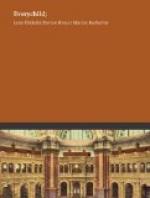“Then,” said the old man, “you might find shelter in yonder house, which hath long remained empty, because it is said to be haunted.” And he pointed to a neglected old house hard by the road. “Though,” he added, “I can assure you that the story which hath it that there are specters in the house is but an idle one. The truth is this: there once dwelt a good woman and her fair daughter in the house; and the cruel king seeing the daughter, he commanded straightway that she be brought to him to become his bride. The good woman, desiring to save her daughter, escaped; and the henchmen of the king, not wishing the real truth to be known, invented the story of a ghost in the house. And since that day no one has ventured to occupy the house after sundown.”
Everychild thanked the old man again; and then, together with all his companions, he entered the old house which had been pointed out to him.
There was, indeed, no trace of ghostly occupants of the house; but on the contrary, the rooms, upstairs and down, speedily became the scene of much jollity. It seemed, also, that the old man had spread the report among the townspeople that a band of children had taken refuge in the house for the night; and many kindly-disposed folk came and brought food and drink, so that there was an abundance for all the children.
After eating heartily, and looking from the windows to observe the castle wherein the king dwelt, they all sought a good night’s rest.
And now once again we must leave Everychild and his companions for a little while, and take our place among surroundings at once strange and cruel.
CHAPTER XVIII
HOW THE HAND OF A CHAMBERLAIN TREMBLED
We are now in a room in the castle of the cruel king, on top of the hill.
The four walls of the room were grim and forbidding of aspect. The tapestry covering them in places was old and of somber design. There were two doors opening to the room: one on the right and one on the left. At the far side of the room there was a deep-silled window with leaded panes through which a dreary light struggled.
At first you would have said that the room was empty; and then you would have perceived the Masked Lady and Mr. Literal, occupying a position among the shadows, not far from the deep-silled window.
The Masked Lady was again wearing the white garment in which we first beheld her. She was seated before a desk, writing in a large book in which you could see a few initial letters in red, outlined in gold.
Mr. Literal stood by her, regarding her with an impatient, puzzled air. And presently it would have seemed that he could no longer endure her silence; for he asked in a fault-finding tone:
“Can you tell me what you’re doing here? This place is—is genuine. And of late it has been your fancy to haunt places which have existed only in the imaginations of the story-tellers.”




